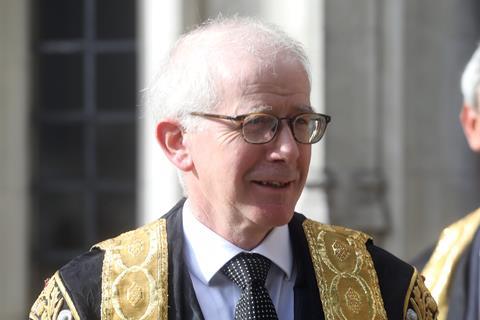The president of the Supreme Court has denied resigning from the Hong Kong Court of Final Appeal as a result of ‘pressure’ from the government, telling parliament that there was ‘no compromise of our judicial independence’ in making the decision.
Lord Reed said any suggestion that he and the Supreme Court’s deputy president Lord Hodge left the court following political interference was a ‘mistaken reading’ of the situation. ‘I actually sought the meeting at which we took a decision because of my own concerns and found that ministers were of the same view,’ Reed told the House of Lords’ constitution committee today.
Reed and Lord Hodge, the only two of the eight non-permanent UK judges who were serving justices of the Supreme Court, resigned last week citing the impact of Beijing’s national security law on freedom of expression.
He told the committee that it was ‘a matter of deep regret to me … that we felt we had to resign’, but said the said the decision was the right one due to the ‘gradual erosion in political freedom and consequently in freedom of speech in Hong Kong’.

Reed said he had concluded that the presence of serving justices was ‘damaging to the interests of the Supreme Court and the respect in which it was held’.
But he emphasised that the decision was not motivated by pressure from the government, saying: ‘There was no compromise of judicial independence – there would have been rich irony if there had been – but there was none. The discussion I had with ministers arrived at a consensus and I was not being dragged out of Hong Kong, as it were.’
Reed also said that he would have resigned from the court even if he was not a serving justice of the Supreme Court, but told the committee that the position of UK judges who continue to serve on the Hong Kong Court of Final Appeal is ‘a matter for them’.
He earlier told the committee that he felt the relationship between the Supreme Court and the government had improved under his presidency and rejected former lord chancellor Lord Falconer’s suggestion that the ‘tensions’ between the executive and judiciary are ‘worse than they have ever been’.
‘I was concerned about the relationship when I took the presidency because it was obvious that, following Miller (No 2), there had been a drop in the temperature to say the least,’ Reed said. ‘I have had a good relationship with each lord chancellor we have had during my presidency and it is very clear to me that the current lord chancellor has no concerns about our failing to understand what our constitutional role is.’
However, he also said: ‘One wants to avoid becoming too chummy with ministers – there has to be a certain distance. We want to have a cooperative relationship but we are not friends.’



























1 Reader's comment